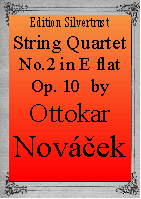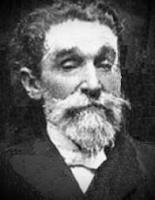Presents
Ottokar Nováček
 |
 |
- Soundbites courtesy of Steve Jones |
String Quartet in No.2 in E flat Major, Op.10
Ottokar Nováček (1866-1900) was a true exemplar of the old, multinational Austrian Empire of the Habsburgs. Of Czech extraction, he was born in southern Hungary in what was then a German speaking town called Weißkirchen. (Fehertémplom in Hungarian and Bela Crkva in Serbo-Croatian)
Novacek began studying the violin with his father and then with Jakob Dont at the Vienna Conservatory before switching to the Leipzig Conservatory where he continued his violin studies Henry Schradieck and Adolf Brodsky while taking composition lessons from Salomon Jadassohn. He played in the Leipzig Gewandhaus Orchestra as well as the famous Brodsky Quartet before moving to the United States where he played in the Boston Symphony Orchestra before serving as principal violist of the New York Philharmonic.
Although he is best known for his Perpetuum mobile for violin and orchestra, he composed several other works including a piano concerto and three string quartets.
“As a member of a concertizing string quartet, Novacek learned all of the best works of the repertoire which contributed to his fine sense of what makes for a good quartet. His String Quartet No.2 was published in 1898. The composer’s nationality can be heard especially in the music of the outer movements. The first movement, Allegro molto, bears the additional marking of ‘in high spirits’. This is certainly a charming movement with fine writing, but best of all is the beautiful tonalities. The second movement is a magnificent, deeply felt Adagio. The Presto which follows begins with a fleet subject but also has a pretty, contrasting melody. The finale, Vivace, is also marked jovial and lively. Novacek uses a Czech folk dance for the main theme. The music requires polished playing from all of the voices to be effective but in so doing makes a highly attractive impression.”—–Wilhelm Altmann writing in his Handbook for String Quartet Players.
This is a very appealing work which would not only make an effective work on a concert program but also should appeal to amateurs. Long out of print, we are pleased to make it available once again.
Parts: $24.95